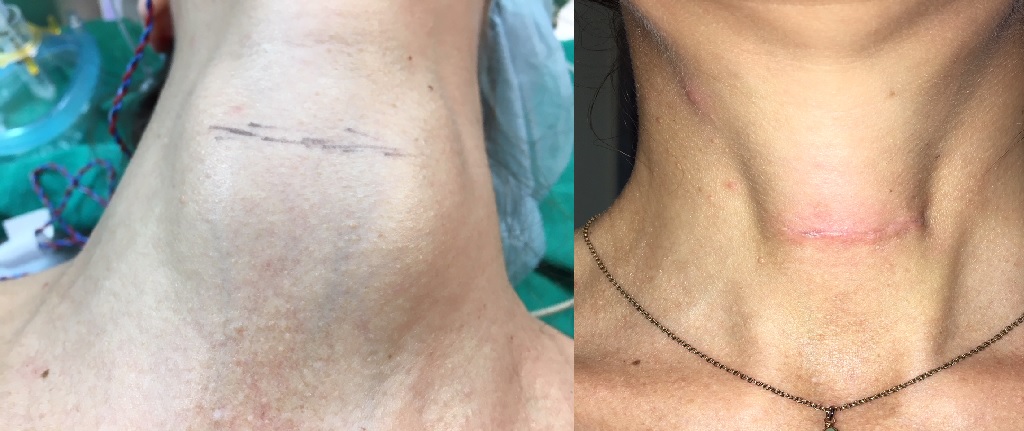- Hyperthyroidism: Overactivity of the thyroid gland, known as hyperthyroidism, can be treated with thyroid surgery to remove all or a portion of the gland. This is less common than other treatments like medications or radioactive iodine therapy.

Conditions Treated by Our Thyroid Surgeons in Rewa
Our experienced thyroid surgeons can diagnose and treat various thyroid conditions, including:
- Thyroid nodules
- Thyroid cancer
- Hyperthyroidism (overactive thyroid)
- Hypothyroidism (underactive thyroid)
- Goiter (enlarged thyroid)
- Thyroid cysts
The Thyroid Surgery Process:
We understand that undergoing surgery can be a significant decision. We’ll guide you through the entire process, from the initial consultation and pre-operative assessments to the surgery itself and post-operative care.
The process of thyroid surgery, also known as thyroidectomy, involves several key steps. This procedure is performed by a surgeon to remove all or a portion of the thyroid gland located in the front of the neck. The reasons for thyroid surgery may include the presence of thyroid nodules, thyroid cancer, hyperthyroidism, or other thyroid-related conditions.
1. Pre-operative Evaluation:
- Before the surgery, you will have a consultation with your surgeon to discuss the procedure, potential risks, and expected outcomes.
- Blood tests may be conducted to assess thyroid hormone levels and overall health.
- In some cases, imaging tests like ultrasound or CT scans may be performed to evaluate the thyroid gland and surrounding structures.
2. Anesthesia:
- Thyroid surgery is typically performed under general anesthesia, which means you will be completely unconscious and feel no pain during the procedure.
3. Incision:
- A small incision is made in the front of the neck, usually just above the collarbone, along a natural skin crease. The length and location of the incision may vary depending on the type of thyroid surgery being performed.
4. Exposure of the Thyroid Gland:
- The surgeon carefully separates the skin and underlying tissues to expose the thyroid gland. Special instruments are used to gently move aside structures like muscles and blood vessels to access the thyroid.
Risk Factor
Hypoparathyroidism: If the parathyroid glands are accidentally removed or damaged during surgery, it can lead to hypoparathyroidism, a condition characterized by low levels of parathyroid hormone (PTH) and calcium. This may require lifelong calcium and vitamin D supplementation.
Hypothyroidism: If the entire thyroid gland is removed (total thyroidectomy), it will result in hypothyroidism, a condition where the body does not produce enough thyroid hormone. Lifelong thyroid hormone replacement therapy will be necessary to maintain normal thyroid hormone levels.
Keloid Formation: In some individuals, excessive scar tissue known as keloids can form at the incision site, which may require additional treatment.
Anesthesia Risks: General anesthesia is typically used during thyroid surgery, and like any surgery involving anesthesia, there are associated risks, including allergic reactions and adverse reactions to anesthesia medications.
In rare cases, other complications such as blood clots, pneumonia, or heart problems can occur, particularly in individuals with pre-existing health conditions.
Benefits of Thyroid Surgery
Diagnosis of Thyroid Conditions: In some cases, a biopsy of thyroid tissue is needed for diagnosis. Surgery allows for the removal of thyroid tissue for further examination, which can provide a definitive diagnosis when less invasive tests are inconclusive.
Relief from Symptoms: Thyroid surgery can provide relief from symptoms caused by thyroid conditions, such as difficulty swallowing, neck discomfort, or compression of nearby structures.
Prevention of Recurrence: In cases of recurrent or persistent thyroid cancer, surgery may be used to remove any remaining cancerous tissue after initial treatment with radioactive iodine therapy.
Improved Quality of Life: For individuals with benign thyroid conditions or those experiencing severe symptoms, surgery can significantly improve their quality of life by addressing the underlying problem.
Medication Reduction: Some individuals with hyperthyroidism or Graves’ disease may require high doses of medication to control their condition. Thyroid surgery can reduce or eliminate the need for such medications.
